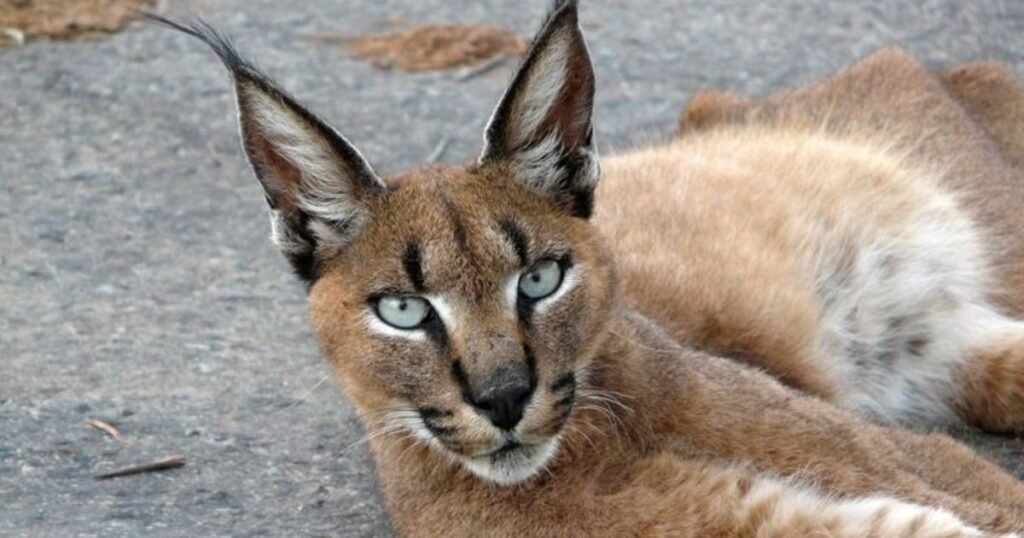
The caracal, a striking wild cat known for its tufted ears and sleek, muscular build, is a fascinating animal that many animal lovers dream of owning as a pet. While caracals are generally wild animals, their intelligence, agility, and affectionate nature have led to an increasing interest in keeping them as pets. But before considering a caracal as a companion, it’s important to understand the unique challenges and responsibilities that come with owning such a rare and exotic pet.
What is a Caracal?

A caracal (scientific name Caracal caracal) is a medium-sized wild cat found in the arid regions of Africa, the Middle East, and parts of Central Asia. These cats are known for their remarkable physical characteristics, including long black tufts on their ears and almond-shaped eyes that give them a mysterious, regal look. They have a robust build, which makes them incredibly agile and capable hunters.
In the wild, caracals are solitary creatures, known for their ability to leap to great heights and catch birds in mid-flight. This remarkable skill makes them one of nature’s most impressive hunters. They are also known for their elusive behavior, making them a challenge to spot in their natural habitats.
Is It Legal to Own a Caracal as a Pet?
Before considering a caracal as a pet, it’s crucial to check the legal regulations in your area. In many countries, keeping a caracal as a pet is illegal or heavily regulated due to the challenges of caring for such a wild animal. Even in areas where it is legal, prospective owners need to meet strict requirements regarding enclosures, permits, and veterinary care.
In some places, exotic animal ownership is only permitted in special circumstances, such as for educational or conservation purposes. Always ensure that owning a caracal complies with local laws to avoid legal trouble.
Must Read : ztec100.com Tech Health and Insurance: The Future Unveiled!
The Pros and Cons of Owning a Caracal
Owning a caracal as a pet is not for everyone. These cats are wild animals with instincts that can sometimes conflict with the needs and expectations of a domestic setting. Let’s take a closer look at the pros and cons of keeping a caracal as a pet.
Pros:
- Aesthetically Pleasing: Caracals are beautiful creatures with distinct physical traits, such as their large tufted ears and athletic physique. Owning one as a pet can be a unique experience, especially for those who appreciate exotic animals.
- Intelligent and Playful: Caracals are highly intelligent and can be trained to perform tricks and follow commands, though this requires a lot of patience and positive reinforcement.
- Loyalty: Unlike many other wild animals, caracals can form strong bonds with their owners. With proper training and socialization, they can be affectionate companions.
Cons:
- Wild Instincts: Despite their domestication potential, caracals still have strong wild instincts. They may exhibit aggression, especially if they feel threatened or are not socialized properly.
- Large Space Requirements: Caracals are not suitable for apartment living. They need large, secure spaces to roam and exercise. A typical backyard is not enough; a large, enclosed area that mimics their natural habitat is essential.
- Expensive Care: Owning a caracal can be expensive. The cost of food, veterinary care, and the necessary permits can add up quickly. Specialized care is required to meet the unique dietary and health needs of a caracal.
Diet and Feeding Requirements of a Caracal

Feeding a caracal is one of the most important aspects of their care. These cats are carnivores, and their diet should primarily consist of meat. In the wild, they hunt small mammals, birds, and even reptiles. As a pet, a caracal’s diet should closely resemble what it would eat in the wild to ensure optimal health.
Here’s a basic guide to feeding your caracal:
- Protein: Caracals require high-quality animal protein. Raw meat, such as chicken, rabbit, or beef, should make up the majority of their diet.
- Supplements: Like many exotic pets, caracals may require additional vitamins and minerals to ensure a balanced diet. Consult with a vet who specializes in exotic animals to create a tailored feeding plan.
- Hydration: Always provide fresh water, as dehydration can lead to serious health problems.
Housing and Enclosure
Providing a proper living environment for a caracal is essential. These cats are accustomed to roaming large territories, and their enclosure should reflect that. Here are some tips for creating a suitable habitat:
- Size: The enclosure should be spacious, allowing the caracal to run, climb, and jump. A minimum of 500 square feet is recommended, though larger is always better.
- Vertical Space: Caracals are excellent climbers and jumpers, so their enclosure should include vertical spaces, such as platforms or trees, to mimic their natural environment.
- Security: Caracals are strong and resourceful, so the enclosure must be secure to prevent escape. Fencing should be tall and made of sturdy materials to withstand their strength.
Health Care and Veterinary Needs
Regular veterinary care is essential for keeping a caracal in good health. These cats require vaccinations, parasite control, and routine checkups to ensure their well-being. Finding a vet who specializes in exotic animals is crucial, as caracals have specific health needs that may differ from domestic cats.
Some common health issues in caracals include:
- Dental problems: As carnivores, caracals can develop dental issues, so regular teeth cleaning and oral checkups are important.
- Obesity: Caracals need a balanced diet and regular exercise to prevent obesity, which can lead to other health complications.
- Parasites: Caracals, like all animals, can be susceptible to parasites, so routine deworming is necessary.
Training and Socialization
Training a caracal is a challenging but rewarding experience. Caracals are intelligent and curious, making them relatively easy to train compared to other wild cats. However, training requires consistency, patience, and positive reinforcement.
When training a caracal, focus on:
- Basic commands: Start with simple commands such as “sit” and “stay,” and reward the cat with treats or praise.
- Socialization: Caracals need to be socialized early on to prevent aggression. Introduce them to new people, pets, and environments in a controlled manner to help them become more comfortable.
- Exercise: Caracals are highly energetic, and regular physical and mental stimulation is essential. Provide toys, climbing structures, and interactive playtime to keep them engaged.
Should You Get a Caracal as a Pet?
While the idea of owning a caracal as a pet can be appealing, it is important to weigh the pros and cons carefully. Caracals are not domesticated cats and require a lot of attention, space, and resources. They can be affectionate companions, but they also come with challenges that should not be underestimated.
If you’re considering getting a caracal as a pet, ensure that you are fully prepared for the responsibility. Research local laws, understand the requirements for care, and be honest about your ability to provide a safe and enriching environment for this exotic animal.
Conclusion
Caracals are beautiful, intelligent, and captivating animals, but they are not for every pet owner. Their needs are complex, and they require an environment that caters to their wild instincts. If you’re considering bringing a caracal into your home, make sure you do extensive research, and be prepared for a rewarding yet demanding experience. Always prioritize the well-being of the animal and ensure that you can meet its needs before making the commitment.




